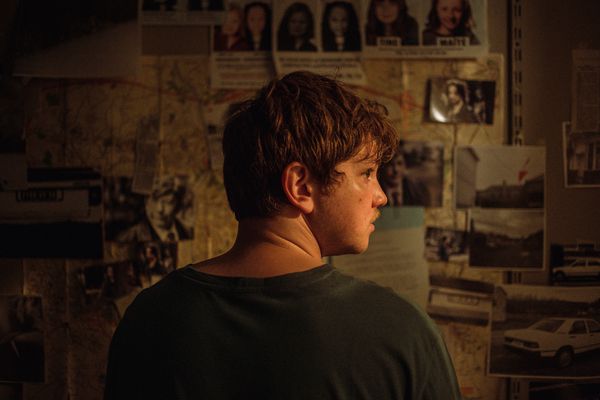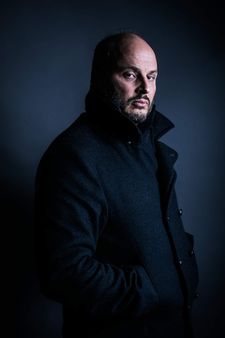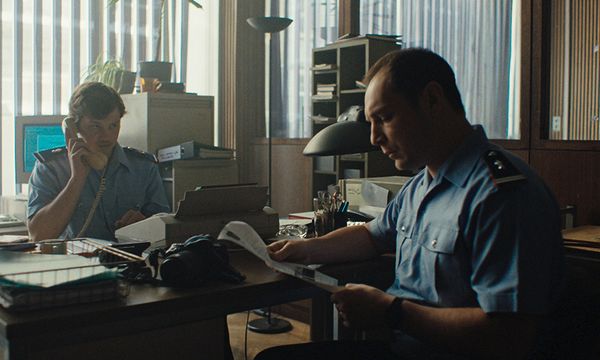 |
| Anthony Bajon in Maldoror. Fabrice du Welz: 'Believe me, it's very close to the case' Photo: Sofia Gheysens |
You've made thrillers and horror movies before, but I wondered whether there were any specific challenges for adapting this story for the big screen, particularly because it’s based on a true crime but also because it was a big scandal in Belgium?
 |
| Fabrice du Welz Photo: Bas Devos |
My screenwriter and I worked just like journalists, we collected facts at the beginning. I know the movie seems a bit long, because there’s a lot of development inside the movie. And each door I open, I need to shut. It was very complicated to articulate at the point when the main dilemma of Paul Chartier's character started. So it's, it's a balance. First, we worked just like journalists, we collected facts, we discussed it with a lot of people who were witnesses of that period and that case. Then we had the idea of the point of view of Paul Chartier, and then we tried to match it, because Paul Chartier, in our mind, represents the people who have been blamed, ostracised, mocked by that story, and the consequences of that story.
It is quite a complicated situation, because you have to explain that kind of tripartite police situation that was in operation at the time.
FdW: It was very complicated. We wanted to make a movie based on that story, because it's been 30 years, and I would have been very frustrated if a French director, or a UK director, or, worse, an American director, took that case and made a movie. It was very important for me to make it, for myself first, and then, my comrade, Belgium, in a way. But it was very important to approach it with the right distance, because I'm not a lawyer, I'm not a judge, I'm just a filmmaker. My goal is to present a good thriller, and then we can talk. And then, of course, people have a lot of questions about what is real, what is not real, mostly outside Belgium, because in Belgium everybody knows the case very well - I mean the Belgian of my generation, or even a little bit younger. But in the UK or in the US or in Korea or whatever, they don't know exactly all the articulation, but believe me, it's very close to the case.
There is no idea for me to be completist, or bullshit like that. It’s just facts. At the time, there were two theories. One theory was the isolated predator, Marc Dutroux. He’s been judged by that theory and is still in jail. The other theory is that it was a network, and that didn't get explored further. And we know by fact, at least there is a network of three people, who we saw in the film. We don't know how much bigger it could be, but at least there is, at least there is a network of three people. I think that raises a question and I think Belgian people didn't get the chance to get a response to the question. Now 30 years on, we made a movie that’s entertainment, in a way, but I hope to reach, in my country, a level of healing. Understand me well, I'm not being pompous here, but it’s about healing the people who suffered on the frontline based on that case. It's political, but it's also social because if those girls who were kidnapped had been from wealthy backgrounds, the case would have been completely different.
 |
| Fabrice du Welz: 'The most important thing for me was to be able to make a good thriller, a good good neo noir film based on true events' Photo: Courtesy of Sitges Film Festival |
It's interesting that you seem so upset that it might have been made by an American director, because you often cite American directors as some of your influences. For example, people like Quentin Tarrantino or Sidney Lumet, whose films this is definitely reminiscent of.
FdW:I love American cinema, of course, that's what had the most influence on me as a teenager. I was obsessed but American cinema has changed so much.
But we tried to make a movie from Paul Chartier’s perspective, just like in old Sidney Lumet’s, you mentioned it, and we tried to approach the case with that magnitude. It's been very complex to articulate that story, because we have the facts, and we have the arc of the character so we worked a lot on it. My main goal was mostly to provoke a debate and, if not, at least people could enjoy a good thriller.
Talking about Paul, he's very damaged by his own past, and yet he has a photographic memory, which seems a terrible irony. You’ve created a character who almost can't escape memory.
FdW: It's impossible to escape memory. When I was in Venice, a Belgian journalist from the main newspaper said to me, “Why are you doing a movie about Dutroux’s case? Everybody wants to forget?” And I was, I was, I was amazed by that question, because, I don't want to forget. I don't want to forget, especially those days. I don't want to forget the shame, the dishonour. That's a big case. And in fact, the irony, just like you said, is Paul Chartier is unable to to forget and the and the arc, for me, of Paul is when, at the end, someone who is now promoted asked him to recognise the face of a guy, so he can get a better promotion. Paul says: “I forget.” So, you know, the arc is done, and he forgets, but he keeps his own energy and his own integrity. Well, I interpret the film a little bit, and I shouldn't do that.
This case is something that is part of the collective memory of Belgium, and maybe there are those who would really rather forget it. To put memory at the heart of the character, was that what you had in mind? To almost shake people and say, “No, look, memory is an important thing in all of this.”
FdW: Absolutely, because Belgium had to face a trauma, it almost destroyed the constitution of Belgium. It's a really, really big scandal that emotionally blew people away. People were enraged, and we were very close to secession. You know, we're very to something major at the time, and I think because of the lack of justice, because Marc Dutroux was judged just like an isolated predator and done. Finito! that's it. I think people were traumatised. They tried to swallow that trauma and hide it away, they don't want to talk about that. When we were scouting for the movie in Charleroi, the moment I said we were making a movie about this terrible case, they’d say, “We don't want to talk about that. Stay away”. And five minutes later, they were with us, talking, talking, talking, talking. So there is something here that people want to express. And I think if that movie can help with that, I would be very happy.





















